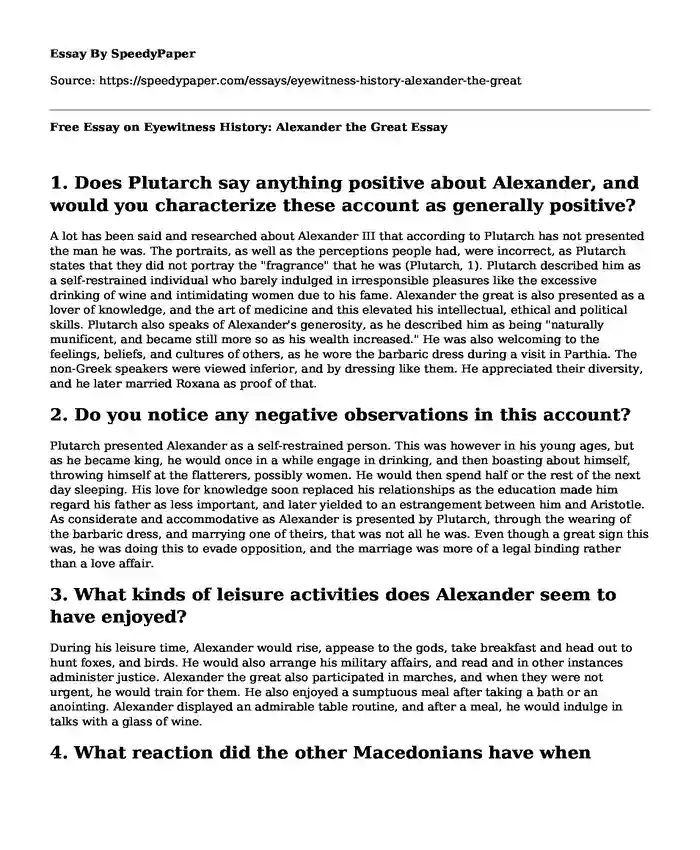
| Type of paper: | Article review |
| Categories: | Alexander The Great Historical literature |
| Pages: | 3 |
| Wordcount: | 648 words |
1. Does Plutarch say anything positive about Alexander, and would you characterize these account as generally positive?
A lot has been said and researched about Alexander III that according to Plutarch has not presented the man he was. The portraits, as well as the perceptions people had, were incorrect, as Plutarch states that they did not portray the "fragrance" that he was (Plutarch, 1). Plutarch described him as a self-restrained individual who barely indulged in irresponsible pleasures like the excessive drinking of wine and intimidating women due to his fame. Alexander the great is also presented as a lover of knowledge, and the art of medicine and this elevated his intellectual, ethical and political skills. Plutarch also speaks of Alexander's generosity, as he described him as being "naturally munificent, and became still more so as his wealth increased." He was also welcoming to the feelings, beliefs, and cultures of others, as he wore the barbaric dress during a visit in Parthia. The non-Greek speakers were viewed inferior, and by dressing like them. He appreciated their diversity, and he later married Roxana as proof of that.
2. Do you notice any negative observations in this account?
Plutarch presented Alexander as a self-restrained person. This was however in his young ages, but as he became king, he would once in a while engage in drinking, and then boasting about himself, throwing himself at the flatterers, possibly women. He would then spend half or the rest of the next day sleeping. His love for knowledge soon replaced his relationships as the education made him regard his father as less important, and later yielded to an estrangement between him and Aristotle. As considerate and accommodative as Alexander is presented by Plutarch, through the wearing of the barbaric dress, and marrying one of theirs, that was not all he was. Even though a great sign this was, he was doing this to evade opposition, and the marriage was more of a legal binding rather than a love affair.
3. What kinds of leisure activities does Alexander seem to have enjoyed?
During his leisure time, Alexander would rise, appease to the gods, take breakfast and head out to hunt foxes, and birds. He would also arrange his military affairs, and read and in other instances administer justice. Alexander the great also participated in marches, and when they were not urgent, he would train for them. He also enjoyed a sumptuous meal after taking a bath or an anointing. Alexander displayed an admirable table routine, and after a meal, he would indulge in talks with a glass of wine.
4. What reaction did the other Macedonians have when Alexander wore his "barbarian" clothes in public?
The other Macedonians did not take the issue lightly, as they deemed it offensive. However, for the sake of the course, they were after, they looked on the brighter side of it, as they considered his act as a way of gaining fame. They also respected his other better qualities, and hence let him off the hook if this gave him pleasure and prestige.
5. Is there any evidence in this selection to support those historians who argue that Alexander wished for peace and unity? If so, what is it?
Other historians have often presented Alexander III as an individual who loved peace and unity. This selection holds a few instances that prove so, whereby he wore the dress of the barbarians, the "inferior" people, and went ahead to train thirty thousand boys to train them on the Greek language and how to use Macedonian weapons. He preferred neutralizing his opposition by bringing them closer to him, "rather than by force" (Plutarch, 4). He had selfish reasons, but going by the fact that he preferred unity to war, the other historians are justified.
Works Cited
Plutarch. Plutarch on Alexander the Great (1st c. BCE). Plutarch's Lives. Translated by Bernadotte Perrin. Cambridge, MA: Harvard University Press. 1919. Pp. 1-5
Cite this page
Free Essay on Eyewitness History: Alexander the Great. (2022, Dec 12). Retrieved from https://speedypaper.net/essays/eyewitness-history-alexander-the-great
Request Removal
If you are the original author of this essay and no longer wish to have it published on the SpeedyPaper website, please click below to request its removal:
- Essay Example on Speech Community Collocations in Second Language
- Essay Sample on Adults and Difficulties in Learning a Second Language
- Compare and Contrast Essay Sample
- Nursing Essay Sample: The Effects of Post-operative Environments
- US Histoty Essay Sample: 19th-century Housing Reforms. Strengths and Weaknesses of Progressivism.
- How Technology is Affecting Social Skills - Essay Sample
- Paper on The Hobbit's Heroic Odyssey: Bilbo Baggins' Journey for Treasure
Popular categories




